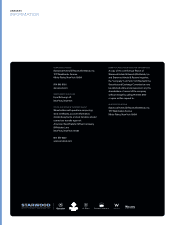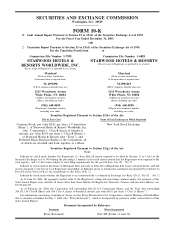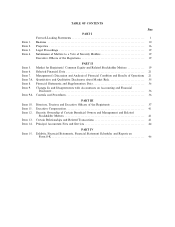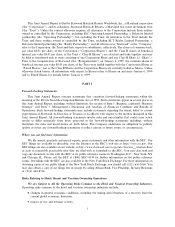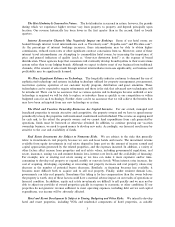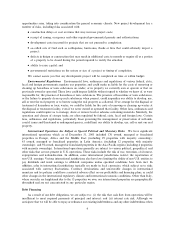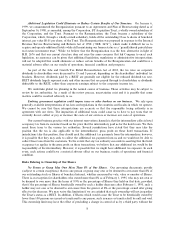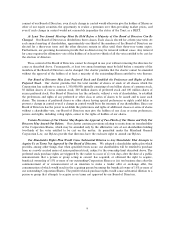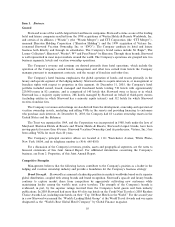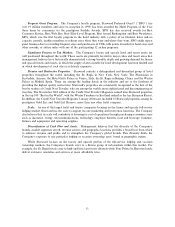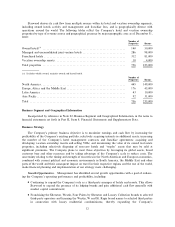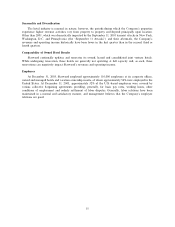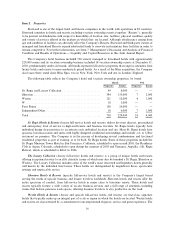Starwood 2003 Annual Report Download - page 16
Download and view the complete annual report
Please find page 16 of the 2003 Starwood annual report below. You can navigate through the pages in the report by either clicking on the pages listed below, or by using the keyword search tool below to find specific information within the annual report.We may also encounter challenges with an insurance provider regarding whether it will pay a particular
claim that we believe to be covered under our policy. Should an uninsured loss or a loss in excess of insured
limits occur, we could lose all or a portion of the capital we have invested in a hotel or resort, as well as the
anticipated future revenue from the hotel or resort. In that event, we might nevertheless remain obligated for
any mortgage debt or other Ñnancial obligations related to the property.
Acquisitions
We intend to make acquisitions that complement our business. There can be no assurance, however, that
we will be able to identify acquisition candidates or complete acquisitions on commercially reasonable terms
or at all. On December 30, 2003, we announced our share ($200 million) of the acquisition with Lehman
Brothers Holdings Inc. (""Lehman Brothers'') of all of the outstanding senior debt of Le Meridien and our
exclusive agreement with Lehman Brothers through March 5, 2004 to negotiate the recapitalization of Le
Meridien, which may be extended through early April 2004. There can be no assurance that a recapitalization
of Le Meridien involving Starwood will take place and if it does what the terms will be.
If the Le Meridien transaction or additional acquisitions are made, there can be no assurance that any
anticipated beneÑts will actually be realized. Similarly, there can be no assurance that we will be able to obtain
additional Ñnancing for acquisitions, or that the ability to obtain such Ñnancing will not be restricted by the
terms of our debt agreements.
Investing Through Partnerships or Joint Ventures Decreases Our Ability to Manage Risk
In addition to acquiring or developing hotels and resorts directly, we have from time to time invested, and
expect to continue to invest, as a co-venturer. Joint venturers often have shared control over the operation of
the joint venture assets. Therefore, joint venture investments may involve risks such as the possibility that the
co-venturer in an investment might become bankrupt or not have the Ñnancial resources to meet its
obligations, or have economic or business interests or goals that are inconsistent with our business interests or
goals, or be in a position to take action contrary to our instructions or requests or contrary to our policies or
objectives. Consequently, actions by a co-venturer might subject hotels and resorts owned by the joint venture
to additional risk. Although we generally seek to maintain suÇcient control of any joint venture, we may be
unable to take action without the approval of our joint venture partners. Alternatively, our joint venture
partners could take actions binding on the joint venture without our consent. Additionally, should a joint
venture partner become bankrupt, we could become liable for our partner's share of joint venture liabilities.
Dispositions
We periodically review our business to identify properties or other assets that we believe either are non-
core, no longer complement our business, are in markets which may not beneÑt us as much as other markets
during an economic recovery or could be sold at signiÑcant premiums. We are focused on restructuring and
enhancing real estate returns and monetizing investments and from time to time, attempt to sell these
identiÑed properties and assets. There can be no assurance, however, that we will be able to complete
dispositions on commercially reasonable terms or at all.
Our Vacation Ownership Business Is Subject to Extensive Regulation and Risk of Default
We market and sell VOIs, which typically entitle the buyer to ownership of a fully-furnished resort unit
for a one-week period on either an annual or an alternate-year basis. We also acquire, develop and operate
vacation ownership resorts, and provide Ñnancing to purchasers of VOIs. These activities are all subject to
extensive regulation by the federal government and the states in which vacation ownership resorts are located
and in which VOIs are marketed and sold including regulation of our telemarketing activities under state and
federal ""Do Not Call'' laws. In addition, the laws of most states in which we sell VOIs grant the purchaser the
right to rescind the purchase contract at any time within a statutory rescission period. Although we believe
that we are in material compliance with all applicable federal, state, local and foreign laws and regulations to
which vacation ownership marketing, sales and operations are currently subject, changes in these requirements
6


